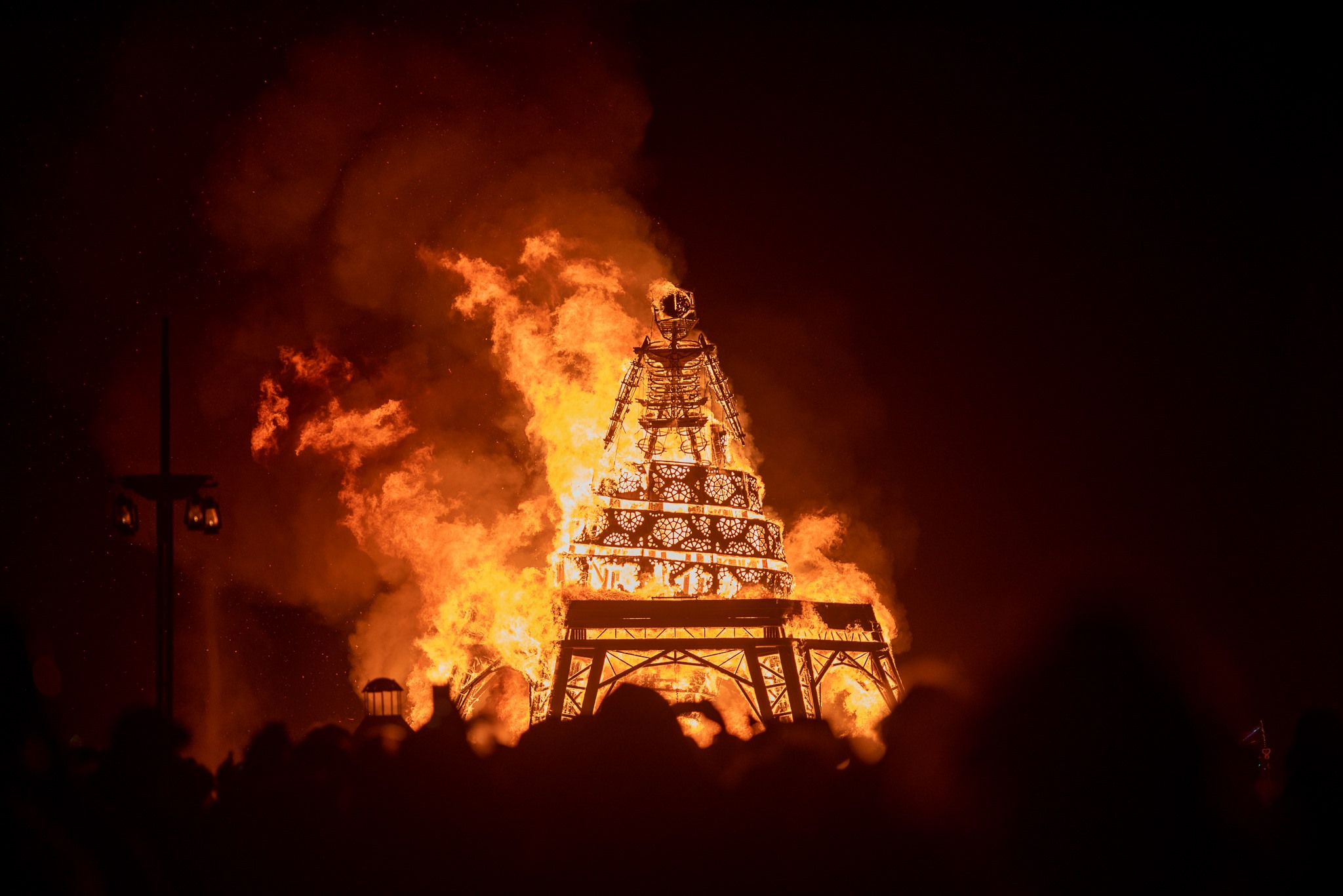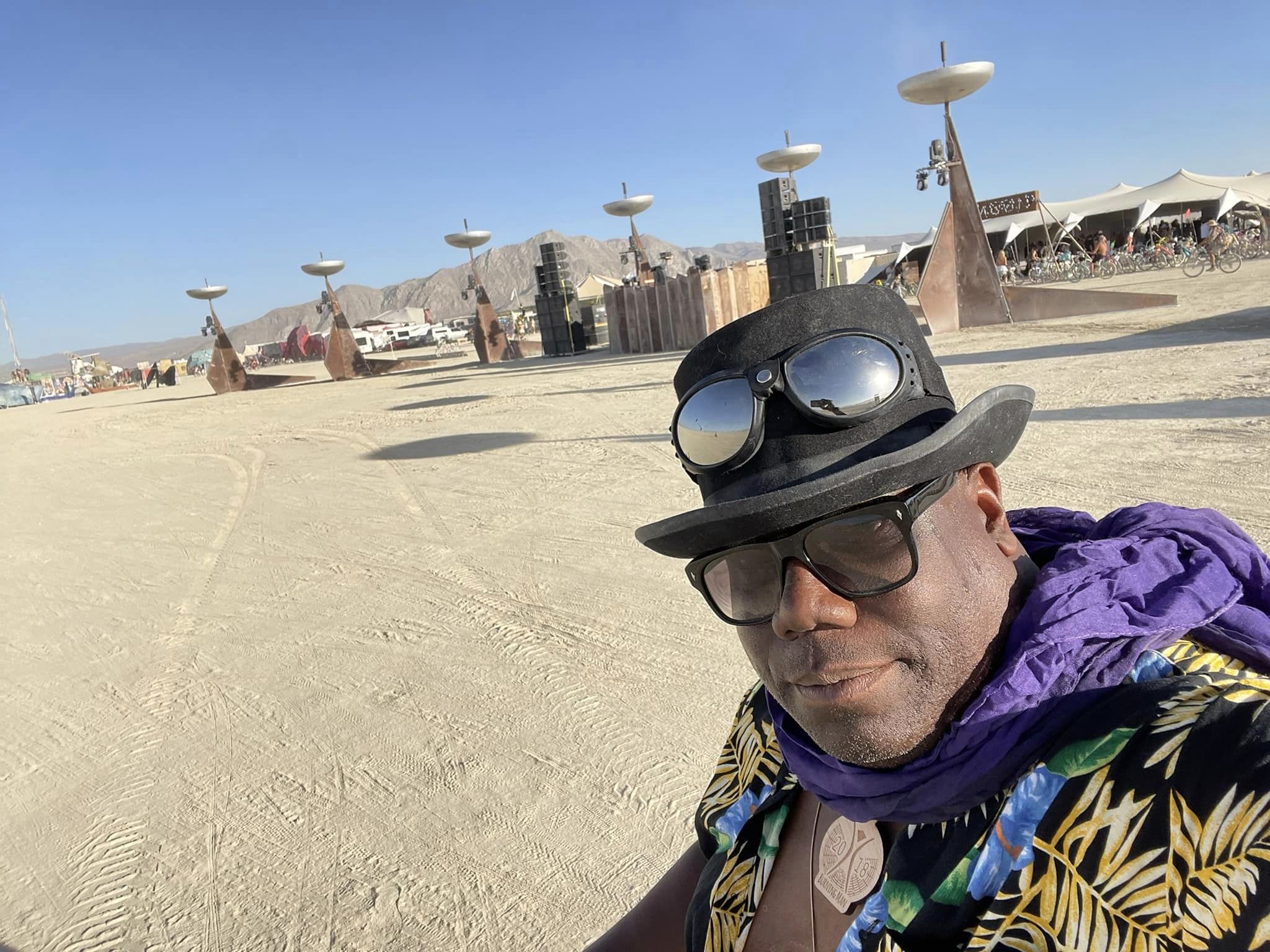The mission and definition of Burning Man Project change drastically depending on who you ask, but a lot of people today would call it a music festival.
See, as electronic music has moved into the spotlight on an international scale, so has the Burning Man Project with electronic music festivals increasing in both popularity–and revenue–over the last decade.
Similar to Coachella, Burning Man has started to appear more on celebrity Instagram pages. Chris Rock, Austin Butler, Paris Hilton, and even Elon Musk are just some of the major celebrities who have been reported to attend in recent years.
Along with an increased celebrity presence, music has seemingly started to grow as a focus of the Burning Man Project. While attendees have always had music in the background at their campsites, music has grown as an art form on the Playa.
The more popular the event has gotten, the more electronic artists have attended and gotten inspired. In the past few years, set times of artists attending have started to appear on Instagram. Artists such as Spencer Brown, Slander, and Maddy O’Neal all posted on Instagram about the location and time of all their sets on the Playa.
And yet, calling Burning Man a music festival makes many people cringe, due to the insinuation of the event becoming more commercial and deviating away from its original 10 principles.
Others believe that the integration of electronic music into its annual event has allowed the growth and expansion so many crave from coming back each year. So, is it a music festival or not?
The event organizers, Larry Harvey and Jerry James describe Burning Man as “a global ecosystem of artists, makers, and community organizers who co-create art, events, and local initiatives around the world.”
Most recognizably, tens of thousands of attendees (commonly known as Burners) gather annually to build Black Rock City, a “participative temporary metropolis in the Nevada desert.”
Founded in 1986 using 10 guiding principles—such as leaving no trace, radical inclusion, communal effort, and more—Burning Man is known to its community as the creation of a temporary city each year, the ideas of which span beyond the event itself.
Music, art, and self-expression have been a staple of this event since its inception.
Live music at Burning Man once had a focus on acoustic style–playing guitars around campfires and such. As the event has progressed and grown on a massive scale, though, there has been an increase in electronic music taking center stage.
Shaun Brefo and Cat Binx are both relatively new to the Burner community and attended this past year for their first and second times, respectively.
Brefo was a part of the Legendary Playground of the Gods. This 120-person camp focused on using acoustic healing (sound baths) and art.
He noticed that there was music all around him, but chasing set times was the furthest thing from his mind. He went where he felt drawn to, wandering aimlessly with his friends.

Binx, on the other hand, attended Burning Man as a fire performer with her camp PyrOasis. When she first entered the festival, each attendee was given a program booklet of all the music takeovers that happen throughout the week.
There are no set times or artists listed in the programs, only their takeovers. She had done some research beforehand on Instagram to try to chase certain sets of electronic artists she knew she’d want to see, but once she got there, her plans were thrown out the window.
She spent almost half of her time trying to find the sets she had researched beforehand but ended up just going with the flow and discovering new artists she didn’t expect.
“The gift that DJs and musical artists are providing us here is music” Binx said.
One of the 10 Burning Man principles is gifting: “The value of the gift is unconditional and is used in place of any monetary currency (such as a dollar bill).”
Since there is no monetary currency going around, musical artists attend and perform at Burning Man to provide their gift of music to other Burners. Artists like Carl Cox, Charlotte de Witte, LP Giobbi, and more all performed at Burning Man 2023.
According to Binx, they were just doing their part to follow the Burning Man principles, and allowing others to help show their gifts by doing things with sound/lighting equipment and lasers.
While her experience was more centered around performing with her fire conclave than it was chasing music, she did note the music she saw as one of the best parts of her experience, as it allowed her to have deeper connections with her peers through dance.

We also spoke to the owner of the camp Cool Cat Cafe, Chris Chanaud—also known by his playa name Jedi Kitty. This camp hosts a bar/cafe and chill dome for people to come and relax.
Chanaud has been attending Burning Man since 2005, only missing one (plus the COVID-19 years) since. When he first started going, there was a focus on acoustic music. However, in his 16 years at the event, he has noticed an increase in a “raver community.”
While some of the OG Burners have taken a dislike to the rise of this electronic music, he himself has accepted that Burning Man grows and evolves over time.
His Cool Cat Cafe camp turns into a bar at night and hosts local DJs playing dance music. They do not go on the lookout to find any famous DJs to play, instead keeping their camp members on the decks.
Over the years at Burning Man, Chanaud has seen an increase of newcomers at Burning Man, compared to the originals that used to go back in ‘05.
He attributes this to many of the older burners starting to settle down and have families, shifting the priority of going to Burning Man to other life goals they want to accomplish.
Chanaud also attributes this change to the price increase of tickets, which were once between $100-$200 but are now well over $700.
While this could have to do with the increase in electronic music being present, his guess is that the price increase is due to overall production getting bigger and better (art, camp amenities, etc.)
Chanaud typically likes to stick to his camp and listen to music there, or other sound camps. He is not one to chase the music, but rather follow his friend group.
The word “Man” in the title of “Burning Man” symbolizes a lot more than we realized at the beginning of this research. As men (and humans) evolve in their daily lives, so does the Burning Man Project itself.
Acting as a human, with time the event has grown and changed as new ideas have come to life. Like your favorite band releasing a new style of music as they evolve as artists, Burning Man has adapted this same idea.
Electronic music often encapsulates a feeling of human connection, a feeling many Burners chase themselves. The Burning Man Project has decided to adopt electronic music into its grounds as these ideas flow seamlessly together.
Is Burning Man a music festival? A playground? An adult Disneyland? Yes…Burning Man is whatever each Burner decides it to be.
Burners will accept you as you want to Burn. So if you think it is a music festival, you are correct. If you would like to denounce that idea and stick to the rhetoric of it being a temporary city/event, you’d also be correct.
Go to Burning Man yourself to define what it is in your mind.







